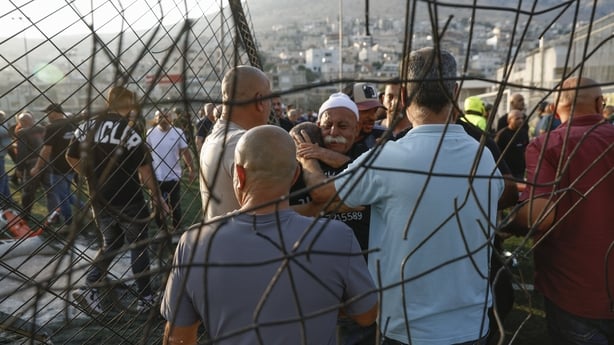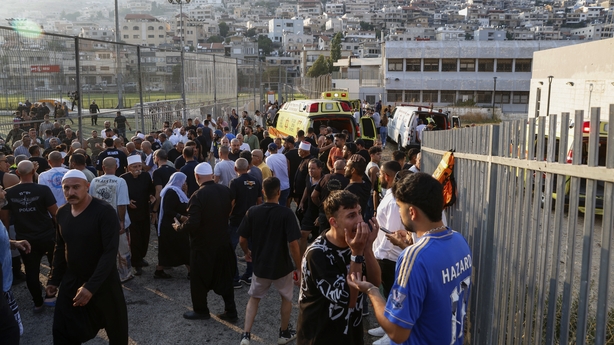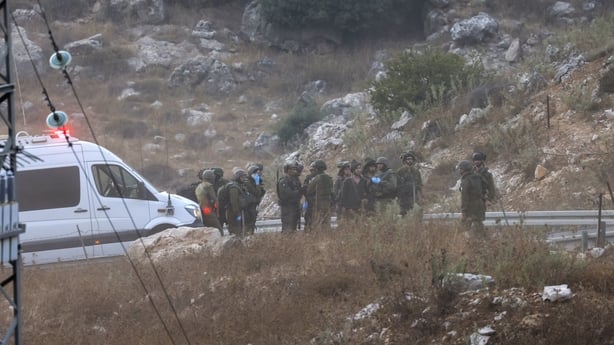A rocket attack on a football ground in the Israeli-occupied Golan Heights has killed 12 people, including children, Israeli authorities said, with Israel accusing Hezbollah of the strike but the Lebanese group denying any role.
Hezbollah denied any responsibility for the strike, the deadliest in Israel or Israeli-occupied territory since the start of the war in Gaza.
The attack escalated tensions in the conflict which has been fought in parallel to the Gaza war and has raised fears of a wider conflict between the heavily armed adversaries.
The rocket struck a football pitch in the Druze village of Majdal Shams in the Israeli-occupied Golan Heights, territory captured from Syria by Israel in the 1967 Middle East war and annexed in a move not recognised by most countries.
"Hezbollah will pay a heavy price, the kind it has thus far not paid," Israeli Prime Minister Benjamin Netanyahu said in a phonecall with the leader of the Druze community in Israel, according to a statement from his office.
In a written statement, Hezbollah said: "The Islamic Resistance has absolutely nothing to do with the incident and categorically denies all false allegations in this regard."
Israeli military spokesman Daniel Hagari said: "We will prepare for a response against Hezbollah ... we will act".
He added that the incident was the "deadliest attack on Israeli civilians since 7 October" when Hamas militants attacked southern Israel prompting the war in Gaza.
The group had earlier announced several rocket attacks targeting Israeli military positions in other locations.
The Israeli ambulance service said 13 more people were wounded by the rocket.
"We witnessed great destruction when we arrived at the soccer field, as well as items that were on fire," Idan Avshalom, a medic with the Magen David Adom ambulance service, said.
There were casualties on the grass and the scene was gruesome," he added.
Footage posted on social media showed the moment the rocket hit. An air raid siren can be heard, followed by a big explosion and images of smoke rising.
Reuters was able to independently verify the location with the buildings and road layout that matched the satellite imagery of the area.
Mr Netanyahu, already due to head back from the United States to Israel overnight, said he would bring his flight forward and convene his security cabinet upon arrival.

The United States, which has been leading diplomatic efforts aimed at de-escalating the conflict across the Lebanese-Israeli border, condemned it as a horrific attack and said US support for Israel's security was "iron-clad and unwavering against all Iranian backed terrorist groups, including Lebanese Hezbollah".
The United States "will continue to support efforts to end these terrible attacks along the Blue Line, which must be a top priority," the spokesperson for the White House National Security Council said in a statement.
The Blue Line refers to the frontier between Lebanon and Israel.
A senior diplomat focused on Lebanon said all efforts were now needed to avoid an all out war.
The Israeli military said the rocket launch was carried out from an area located north of the village of Chebaa in southern Lebanon.

Mr Netanyahu's far-right coalition ally, Finance Minister Bezalel Smotrich called for tough retaliation, including against Hezbollah's leader, Sayyed Hassan Nasrallah.
"For the death of children, Nasrallah should pay with his head. All of Lebanon should pay," Mr Smotrich posted on X.
Andrea Tenenti, spokesperson for the UNIFIL peacekeeping force which operates in southern Lebanon, told Reuters its force commander was in contact with authorities in both Lebanon and Israel "to understand the details of the Majdal Shams incident and to maintain calm".
We need your consent to load this rte-player contentWe use rte-player to manage extra content that can set cookies on your device and collect data about your activity. Please review their details and accept them to load the content.Manage Preferences
Meanwhile the Irish Defence Forces said that Irish personnel serving in Golan Heights are safe.
In April this year, the Irish Defence Forces ended its final peacekeeping mission with the United Nations Disengagement Observer Force (UNDOF) in the Golan Heights on the Israeli-Syrian border.
However, this evening a spokesperson for the Irish Defence Forces confirmed that "a small number of Defence Forces personnel continue to serve in UNDOF HQ in Camp Faouar" in Golan Heights.
The spokesperson said that "all these personnel are accounted for, are safe and well and continue to perform mandated operations".
In the United Nations Interim Force in Lebanon (UNIFIL), 332 Irish peacekeepers are also currently serving with the 124th Battalion.
The Defence Forces spokesperson said that "all personnel serving with the 124 Battalion in UNIFIL were safe and well" and the "incident ... in the Golan Heights was some distance from where Irish military personnel are currently performing their peacekeeping duties".
Attacks from Lebanon
Hezbollah is the most powerful of a network of Iran-backed groups across the Middle East that have entered the fray in support of their Palestinian ally Hamas since October.
Iran-backed Iraqi groups and the Houthis of Yemen have both fired at Israel.

Hamas has also carried out rocket attacks on Israel from Lebanon, as has the Lebanese Sunni group, the Jama'a Islamiya, since October.
The Israeli-occupied Golan Heights were part of Syria until 1967, when Israel captured most of the area in the Middle East war, annexing it in 1981.
That unilateral annexation was not recognised by most countries and Syria demands the return of the territory.
More than 40,000 people live on the Israeli-occupied Golan, more than half of them Druze residents.
The Druze are an Arab minority who practice an offshoot of Islam.
The attack on the soccer pitch followed an Israeli strike in Lebanon that killed four militants.
The four fighters killed in the Israeli strike on Kfar Kila in southern Lebanon were members of different armed groups, according to two security sources in Lebanon.
They added that at least one belonged to Hezbollah.
The Israeli military said its aircraft had targeted a military structure belonging to Hezbollah, after identifying a militant cell entering the building.
At least 30 rockets were then fired from Lebanon across the border, the military said.
Hezbollah earlier claimed at least four attacks, including with Katyusha rockets, in retaliation for the Kfar Kila attacks.
Additional reporting Laura Fletcher

